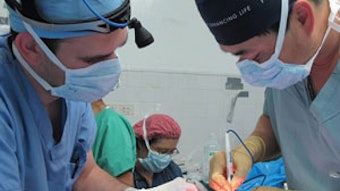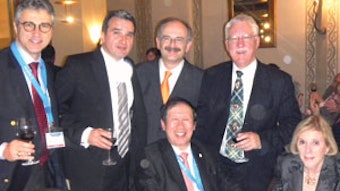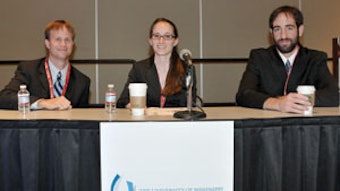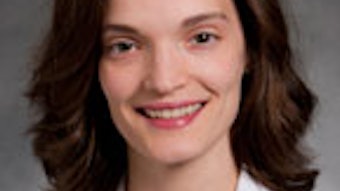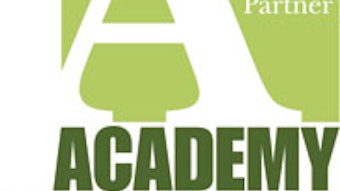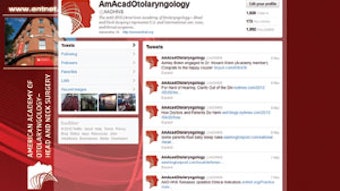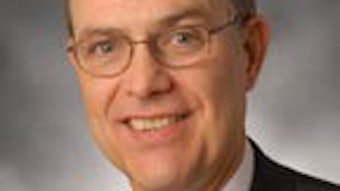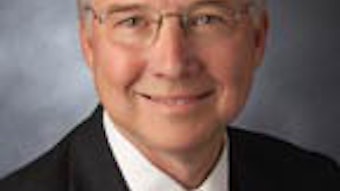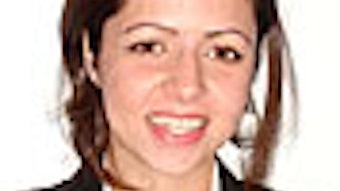2012 Basic & Translational Research Miniprogram
Miniprogram: Sleep Medicine This is part of a Bulletin series of course samplers from the myriad options to be offered at the 2012 AAO-HNSF Annual Meeting & OTO EXPO in September. To read the full course description and to get your first choice of courses, sign up early at www.entnet.org/Annual_Meeting. Make sure to take advantage of the scheduler to review the full listing of courses and find those of special interest to you. This year’s Basic & Translational Research miniprogram will focus on sleep medicine. The program, developed by Edward M. Weaver, MD, MPH, chair; Scott E. Brietzke, MD, MPH, co-chair; and Pell Ann Wardrop, MD, co-chair, seeks to cover a broad spectrum of topics relevant to sleep apnea and surgical treatment, with a focus on research topics and data. The topics range from basic science relevant to understanding the upper airway pathology (miniseminar no. 1), to data on emerging surgical treatments (miniseminar no. 2), to research that influences policies relevant to sleep surgery (miniseminar no. 3). The miniprogram will highlight major advances in the field of sleep apnea research relevant to surgery and the important areas in need of deeper understanding at each level, from bench to policy development. The guest speakers are leaders in the field of sleep medicine. The 2012 Neel Distinguished Research Lecturer, Allan I. Pack, MBChB, PhD, was selected to complement the three miniseminars. Dr. Pack is a world-renowned expert in the field and a dynamic speaker. His lecture will provide an overview on genetics in the context of OSA, sharing both experience and data from a large genetics study he is leading in Iceland, an area that provides unique advantages for genetics studies. Atul Malhotra, MD, is the director of the Sleep Program at Harvard’s Brigham & Women’s Hospital and an international leader on normal upper airway physiology and sleep apnea airway pathophysiology. While otolaryngologists are expert in assessing the anatomical features of the upper airway, most otolaryngologists do not as well understand the physiological basis of upper airway collapse during sleep. Nelson Powell, MD, DDS, is clinical professor of sleep medicine at Stanford University and is a pioneer of sleep surgery and sleep research. Dr. Powell will speak on a new area of research using computational fluid dynamics to understand airflow and its potential adverse effects on the airway tissues in normal and sleep apnea patients. Dr. Powell’s presentation will complement the presentation by Leila Kheirandish-Gozal, MD, associate professor of pediatrics at the University of Chicago, who will speak on upper airway tissue damage, i.e., neuropathy, as a pathogenetic mechanism for OSA. Innovations in surgical treatment of OSA include modification and refinements of existing techniques, topics covered in instruction courses annually at the AAO-HNSF Annual Meeting & OTO Expo. Promising new innovations also include using new technologies, new approaches, and newly invented devices to address upper airway collapse during sleep. Robotic approaches for pharyngeal surgery are being tested for OSA, and early data on this approach will be presented during the second miniseminar, along with three hypoglossal nerve stimulation devices, which are in various stages of human testing and show early promise as a tool to treat tongue-base obstruction in OSA. A review of the latest available data for this approach will be presented. Other new devices and approaches will also be covered, some with more data than others. Thus, this miniseminar serves to review data on the latest cutting-edge technologies being tested to treat OSA surgically. The third and final miniseminar will discuss recently published reviews of sleep surgery that focus on sleep testing outcomes, review data on sleep surgery outcomes, and present new data on cost-effectiveness of sleep surgery. Several reviews and guidelines for the treatment of OSA have been published in the last few years. The reviews and criticisms of surgical treatment outcomes have focused largely on inadequate cure rates of OSA as measured by the apnea-hypopnea index. This miniseminar reviews the state of the sleep surgery literature and policy, and it looks forward to data and models that may help dictate future policy for the role of sleep surgery. Sleep Apnea—From Bench to Bedside and Beyond 8 am–9:20 am Tuesday, September 11 Obstructive Sleep Apnea Pathophysiology Moderator: Edward M. Weaver, MD, MPH Upper airway physiology and OSA pathophysiology, Atul Malhotra, MD; Upper airway neuropathy in the pathogenesis of OSA, Leila Kheirandish-Gozal, MD; Computer modeling of the upper airway in normals and OSA, Nelson B. Powell, DDS, MD. Novel Sleep Apnea Surgical Treatments 9:30 am–10:20 am Moderator: Scott E. Brietzke, MD, MPH Robotic sleep surgery, Erica R. Thaler, MD; Hypoglossal nerve stimulators, Eric J. Kezirian, MD, MPH; Novel surgical treatments under development, B. Tucker Woodson, MD. Sleep Surgery Treatment Outcomes & Policy 10:30 am–11:50 am Moderator: Pell Ann Wardrop, MD Systematic reviews and guidelines, Ofer Jacobowitz, MD, PhD; Sleep surgery treatment outcomes, Edward M. Weaver, MD, MPH; Cost-effectiveness of uvulopalatopharyngoplasty, Jonathan R. Skirko, MD.
Miniprogram: Sleep Medicine
This is part of a Bulletin series of course samplers from the myriad options to be offered at the 2012 AAO-HNSF Annual Meeting & OTO EXPO in September. To read the full course description and to get your first choice of courses, sign up early at www.entnet.org/Annual_Meeting. Make sure to take advantage of the scheduler to review the full listing of courses and find those of special interest to you.
This year’s Basic & Translational Research miniprogram will focus on sleep medicine. The program, developed by Edward M. Weaver, MD, MPH, chair; Scott E. Brietzke, MD, MPH, co-chair; and Pell Ann Wardrop, MD, co-chair, seeks to cover a broad spectrum of topics relevant to sleep apnea and surgical treatment, with a focus on research topics and data. The topics range from basic science relevant to understanding the upper airway pathology (miniseminar no. 1), to data on emerging surgical treatments (miniseminar no. 2), to research that influences policies relevant to sleep surgery (miniseminar no. 3).
The miniprogram will highlight major advances in the field of sleep apnea research relevant to surgery and the important areas in need of deeper understanding at each level, from bench to policy development.
The guest speakers are leaders in the field of sleep medicine. The 2012 Neel Distinguished Research Lecturer, Allan I. Pack, MBChB, PhD, was selected to complement the three miniseminars. Dr. Pack is a world-renowned expert in the field and a dynamic speaker. His lecture will provide an overview on genetics in the context of OSA, sharing both experience and data from a large genetics study he is leading in Iceland, an area that provides unique advantages for genetics studies.
Atul Malhotra, MD, is the director of the Sleep Program at Harvard’s Brigham & Women’s Hospital and an international leader on normal upper airway physiology and sleep apnea airway pathophysiology. While otolaryngologists are expert in assessing the anatomical features of the upper airway, most otolaryngologists do not as well understand the physiological basis of upper airway collapse during sleep.
Nelson Powell, MD, DDS, is clinical professor of sleep medicine at Stanford University and is a pioneer of sleep surgery and sleep research. Dr. Powell will speak on a new area of research using computational fluid dynamics to understand airflow and its potential adverse effects on the airway tissues in normal and sleep apnea patients. Dr. Powell’s presentation will complement the presentation by Leila Kheirandish-Gozal, MD, associate professor of pediatrics at the University of Chicago, who will speak on upper airway tissue damage, i.e., neuropathy, as a pathogenetic mechanism for OSA.
Innovations in surgical treatment of OSA include modification and refinements of existing techniques, topics covered in instruction courses annually at the AAO-HNSF Annual Meeting & OTO Expo. Promising new innovations also include using new technologies, new approaches, and newly invented devices to address upper airway collapse during sleep.
Robotic approaches for pharyngeal surgery are being tested for OSA, and early data on this approach will be presented during the second miniseminar, along with three hypoglossal nerve stimulation devices, which are in various stages of human testing and show early promise as a tool to treat tongue-base obstruction in OSA. A review of the latest available data for this approach will be presented. Other new devices and approaches will also be covered, some with more data than others. Thus, this miniseminar serves to review data on the latest cutting-edge technologies being tested to treat OSA surgically.
The third and final miniseminar will discuss recently published reviews of sleep surgery that focus on sleep testing outcomes, review data on sleep surgery outcomes, and present new data on cost-effectiveness of sleep surgery. Several reviews and guidelines for the treatment of OSA have been published in the last few years. The reviews and criticisms of surgical treatment outcomes have focused largely on inadequate cure rates of OSA as measured by the apnea-hypopnea index. This miniseminar reviews the state of the sleep surgery literature and policy, and it looks forward to data and models that may help dictate future policy for the role of sleep surgery.
Sleep Apnea—From Bench to Bedside and Beyond
8 am–9:20 am Tuesday, September 11
Obstructive Sleep Apnea Pathophysiology
Moderator: Edward M. Weaver, MD, MPH
Upper airway physiology and OSA pathophysiology, Atul Malhotra, MD;
Upper airway neuropathy in the pathogenesis of OSA, Leila Kheirandish-Gozal, MD;
Computer modeling of the upper airway in normals and OSA, Nelson B. Powell, DDS, MD.
Novel Sleep Apnea Surgical Treatments
9:30 am–10:20 am
Moderator: Scott E. Brietzke, MD, MPH
Robotic sleep surgery, Erica R. Thaler, MD;
Hypoglossal nerve stimulators, Eric J. Kezirian, MD, MPH;
Novel surgical treatments under development, B. Tucker Woodson, MD.
Sleep Surgery Treatment Outcomes & Policy
10:30 am–11:50 am
Moderator: Pell Ann Wardrop, MD
Systematic reviews and guidelines, Ofer Jacobowitz, MD, PhD;
Sleep surgery treatment outcomes, Edward M. Weaver, MD, MPH;
Cost-effectiveness of uvulopalatopharyngoplasty, Jonathan R. Skirko, MD.
